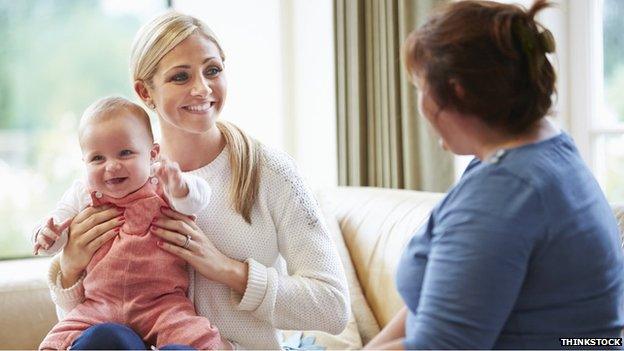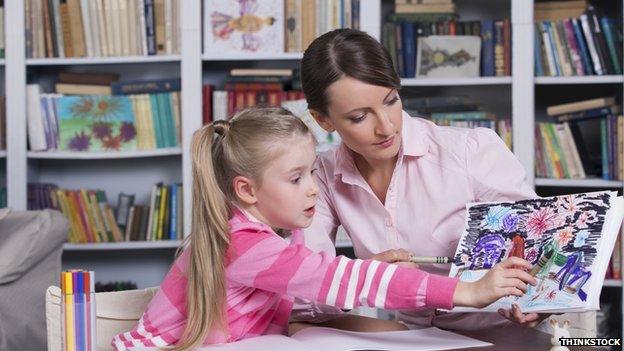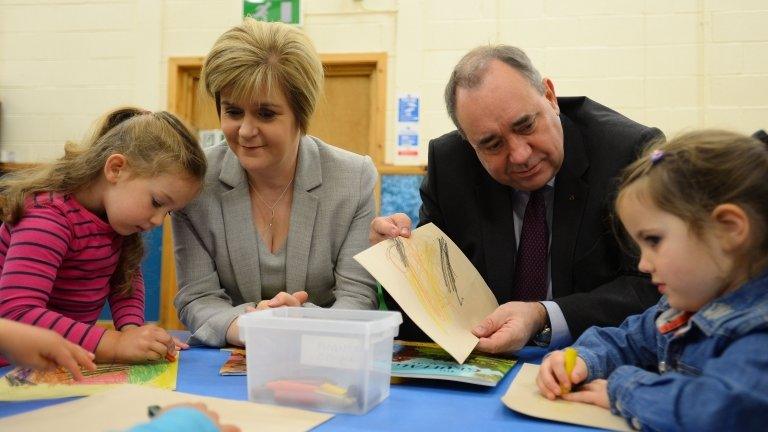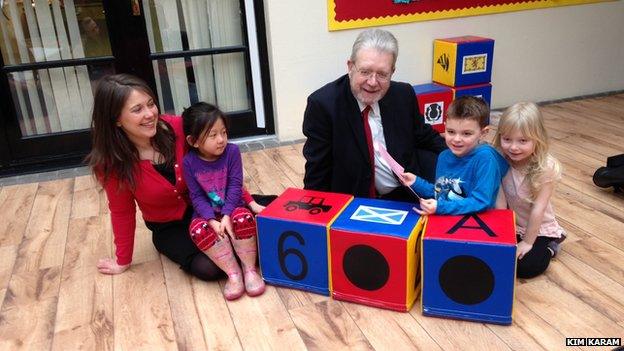Bid to block named person plan goes to Court of Session
- Published

The Scottish government wants to create 500 new health visitor posts by 2018 as part of its plans
A legal challenge to the Scottish government's plan to appoint named guardians for every child in the country is to go to court.
Legal papers formally challenging the named person plans have been lodged at the Court of Session.
The No To Named Persons (NO2NP) campaign group claimed ministers acted illegally and exceeded their powers.
The Scottish government has argued that the proposals would help vulnerable children and families in need.
The measure was contained in the Children and Young People (Scotland) Act, external, and assigns a "named person", such as a teacher or health visitor, to look out for the welfare of every child under 18.
The NO2NP campaign has claimed that the measure contravenes the European Convention on Human Rights.
Colin Hart, director of the Christian Institute, which is involved in the campaign, said: "This marks the beginning of a landmark case which has implication for every family in Scotland.
"We are making a stand for all mums and dads who are doing their best for the children they love.
"We are not prepared to stand by and watch as the roles of parents and their rights to a family life are diminished and trampled over by an authoritarian big brother government intent on making its presence felt in every living room in the land."

The key questions answered

Who will be involved?
Every child up to the age of 18 will be assigned a named person, such as a teacher or health visitor, to look out for their welfare.
What is the named person's role?
To provide a single point of contact to help families access services and flag up any concerns over a child's well-being to other agencies. They must aim to stop vulnerable children slipping through the net and give families extra help.
Why formalise the position?
To allow an independent arbiter to highlight potential cases of abuse and developmental difficulties. This would widen the scope of information-sharing between various agencies. Named Persons will not have direct access to information held by police or health bodies. Under the Act, information may be shared with the Named Person that is likely to be relevant, proportionate and appropriate in relation to the child's wellbeing needs.
Why assign a named person for every child in Scotland?
To try and ensure no section of the community, eg people living in deprived areas or from poor backgrounds, is singled out for attention.
How does it affect parents?
Parents would not be required to accept help or advice from the named person. However, the named person can make their concerns known to other agencies without parental help if they believe there is a serious risk to the child's well-being.

The Scottish Conservatives, who tried unsuccessfully to amend the legislation in the Scottish Parliament, have backed the legal move.
The party's spokeswoman for young people, Liz Smith, said: "The vast majority of parents in Scotland will warmly welcome this legal challenge to what is a deeply unpopular policy.
"Giving everyone up to the age of 18 a named person is not only completely unnecessary, but it undermines the responsibility of parents and families to an unacceptable degree."
Ms Smith added that the policy could result in fewer resources being available for the most vulnerable young people.
In March, Children's Minister Aileen Campbell defended the legislation and said the policy would be rolled out across the country as planned in 2016.
She argued it would stop vulnerable children slipping through the net and give families "somewhere to go if they need an extra bit of help".
A Scottish government spokesman said ministers were confident the legislation was compliant with the European Convention on Human Rights.
Respond promptly
He added: "Families are not required to accept advice or offers of help from the named person.
"Any actions or advice from the named person must be fair, proportionate and respect rights with the aim of safeguarding the well-being of the child."
The policy is already in place in a number of areas, including the Highlands, Edinburgh and Ayrshire.
Highland Council director of care and learning, Bill Alexander, said it formalises relationships which have always existed between families, health visitors and head teachers.
He said: "The named person does not undermine the parental role. It entirely supports the parent who is responsible for the child's well-being.
"By formalising the named person role we have found that other professionals respond promptly to any request for assistance and families get support more quickly.
"In Highland, that means we have fewer children being referred to the children's reporter, fewer at risk of significant harm, fewer looked-after children and fewer young people committing offences.
"That must be welcomed by everyone."
- Published29 June 2014

- Published26 March 2014

- Published19 February 2014
